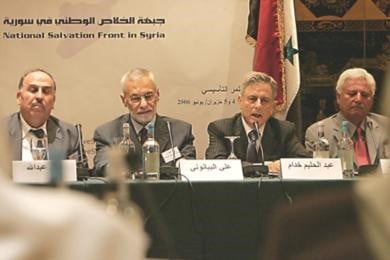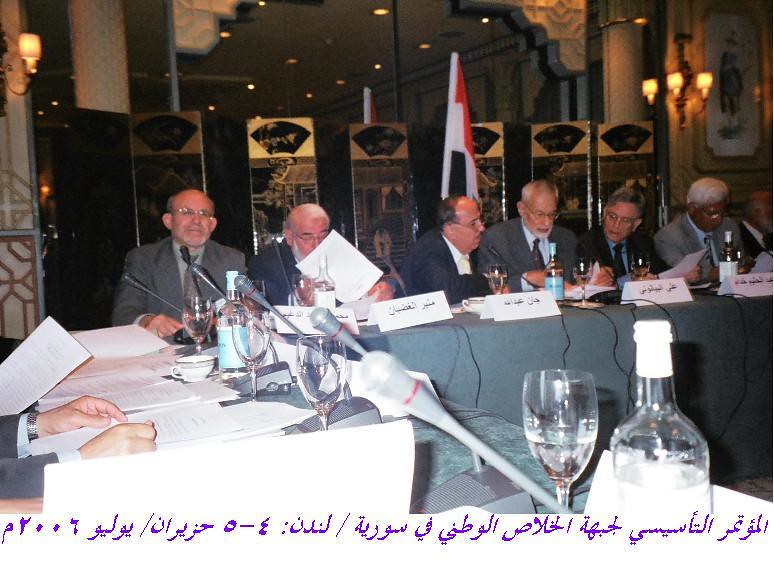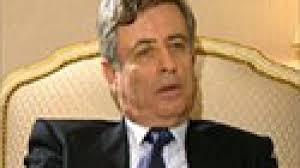Former Syrian Vice President Abdul Halim Khaddam confirmed that Syrian President “Bashar al-Assad is not a strategic ally of Iran but rather a strategic tool for it,” and that “Hezbollah made a mistake by involving itself in political activities in Lebanon” while maintaining its weaponry.
Khaddam’s remarks came in an interview with “United Press International” and in a speech at the opening of the Founding Assembly Conference of the “National Salvation Front” in London yesterday, attended by 50 opposition figures who discussed peaceful ways to change the regime in Damascus.
Khaddam stated in his opening speech, “The current Syrian regime is a regime of individual rule, a regime of family and entourage that aids in spreading corruption and fear.” He emphasized that “there is no choice but for Syrians to choose the path of change and democracy.” He added that “the regime is on the brink of collapse because when the word becomes mightier than the sword and when the owner of thoughts and words are imprisoned, this signifies the regime’s downfall.”
Khaddam acknowledged that “there are significant challenges on the path of change, and we must recognize these difficulties and work to overcome them.” He considered that “Syria today faces two choices: either to continue in the current situation and have its fate be Syria’s demise, with its people suffering even more, or to return to the people and establish a new democratic system that includes the principle of power rotation through free elections, ensures citizens’ freedom, societal freedom, and group and individual freedoms, achieves justice and equality, and ends the policy of isolation and discrimination.”
Responding to a question about Iran’s role in the region and concerns about the “Shia Crescent” warned about by Jordan’s King Abdullah II, Khaddam stated in an interview with “United Press International” that “Iran is a major state in the region with a regional strategy that extends to Central Asia and strategic interests. Therefore, it uses its relationships to serve this direction. Bashar al-Assad is not a strategic ally of Iran but rather a strategic tool for it.”
Khaddam expressed his belief “that one of the reasons for the assassination of Prime Minister Hariri is that those who convinced Bashar al-Assad and involved him in the assassination operation wanted to eliminate a man who was working for Syria’s benefit.” He said that “Prime Minister Hariri served Syria more than he served Lebanon. He was Syria’s Foreign Minister, and we entrusted him with external tasks to mend our relationships with countries that the former Foreign Minister (Farouk al-Sharaa) damaged. I am proud of my friendship with Prime Minister Hariri. May God have mercy on him. He was an Arab and a nationalist who loved Syria and was dedicated to it, and he exerted significant efforts to serve it.”
Regarding his expectations for what the Belgian judge Serge Brammertz will say in his upcoming report, Khaddam said, “Naturally, Brammertz is a discreet man, and nothing has leaked from him. However, based on my previous knowledge about the progress of the investigation, it is expected that the report will include serious matters related to those who planned and carried out the assassination of Prime Minister Hariri and the other assassinations.” He added, “Brammertz and his predecessor, the German judge Detlev Mehlis, are both professionals, but each of them has a different approach. Mehlis leaked information to gather information through reactions. This was his investigation style. As for Brammertz, he has a different approach, which involves controlling information and not leaking it.”
When asked if he supports the proposals calling for disarming “Hezbollah,” Khaddam responded that “Hezbollah led the Lebanese resistance and succeeded in driving the Israelis out of Lebanon and liberating the south. This success would not have been possible without the Lebanese national consensus to support the Lebanese resistance.”
Khaddam considered that the party “made a mistake by involving itself in political activities in Lebanon and became part of the political process there. Consequently, this prompted other Lebanese parties to tell it that it is an armed party and has no right to possess this weapon. The south has been liberated, and if there is an issue related to the Shebaa Farms, I ask your Syrian friends to officially recognize that these farms are Lebanese. Then Lebanon can work through its means to expel the Israelis from the Shebaa Farms. But this has not happened, which led those parties to wonder why Lebanon is being held hostage to the interests of President Bashar al-Assad’s policy or Iran’s policy.”
Yesterday in London, fifty Syrian opposition figures met as part of the “Founding Assembly” of the “National Salvation Front,” which aims to change the Syrian regime through peaceful means and rejects any external intervention in Syria’s affairs.
A source close to Khaddam confirmed to “Agence France-Presse” that the participants “will determine the working program and the leadership of the National Salvation Front, and the meeting will conclude today with a press conference.”
“National Salvation Front” reported that 15 opposition members and human rights activists detained in Syria started a hunger strike on Tuesday, demanding their release. Among the hunger strikers are the journalist Michel Kilo, the writer Ali Abdullah, a member of civil society revival committees in Syria, and his son Mohammed Ali Abdullah. The lawyer Anwar al-Buni and the Secretary-General of the Arab Organization for Human Rights in Syria, Mahmoud Mer’i, are also participating in the hunger strike.



